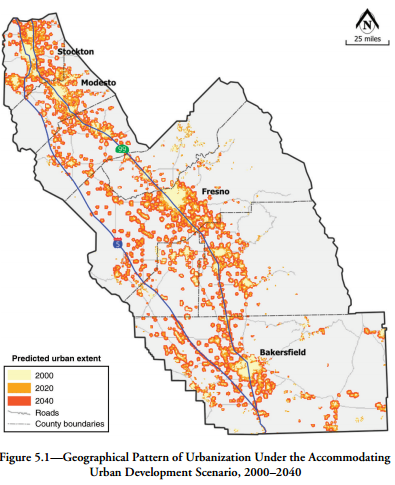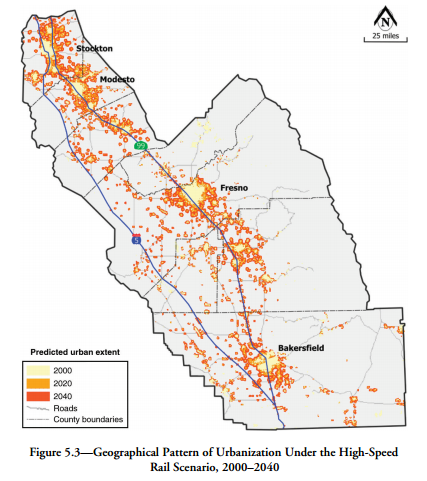Another Reason to Love California High-Speed Rail: It's Drought-Friendly

An artist's rendering of a high-speed train station in California. California High Speed Rail Authority/AP

Connecting state and local government leaders
Despite what critics say, the project will encourage higher-density growth—and save precious water over the long term.
California's high-speed rail project has plenty of critics: nearly half the state , in fact, according to last year's polls. Its $68 billion price tag has most people anxious in the shadow of the state's foreboding "wall of debt." Others are baffled by the starting segment in the San Joaquin Valley (SJV), between Madera and Fresno , calling it a "train to nowhere." And some are upset that the mega-project is " drought intolerant ."
"Man cannot live without water, but he can certainly survive without ever-growing density," wrote Linda Roberts in an Los Angeles Times "Reader's React" column last week. "How can anyone take the drought seriously when the developers and politicians approve constant, frenzied building of malls, gigantic hotels, condos, businesses and residential communities, all of which will impact the water supply?"
Roberts was one of several to write in to frame high-speed rail, and the development that is certain to accompany it, in the context of the the state's historic drought. The American Farmland Trust and agricultural representatives in the SJV have made similar arguments. The drought is likely to last for years , foreshadowing even more devastating dry spells in the future. Does high-speed rail—a money-hungry, high-intensity mega-project—spell sustainability, from a water perspective?
Yes, it does. To pan high-speed rail (HSR) on the basis of the drought is short-sighted. Low-density development uses more water than high-density development does. HSR will encourage the latter, and not just in terms of accommodating induced growth.
Here are some things to understand about the San Joaquin Valley, where HSR construction recently kicked off . Even without the fancy train, tremendous population growth is certain to occur there. Currently, the SJV's eight counties are home to 4 million people, a number that's projected to growth to more than 7.5 million by 2050. It's the fastest-growing region in California, whose overall population (currently 38.8 million) is expected to grow by about 12 million in the same time-frame. Also of note: the SJV is also overwhelmingly farmland, grows the vast majority of America's produce , and plenty of the world's. It is also among the absolute poorest regions in the country .
Those millions of people coming to the SJV are going to set roots somewhere. No matter what, hundreds of thousands of acres of land that are currently used by agriculture are going to be sold to developers and become urbanized. And if California had no big infrastructure project planned, and merely allowed historical patterns to unfold, urbanization of the Valley would continue in its current shape: sprawling, low-density development, with greater quantities of farmland swallowed up. Think " ranchettes ," the bane of every SJV farmer's existence: non-farming, suburban-style homes on ten-plus-acre parcels. A 2005 report from the Public Policy Institute of California projected an idea (not a precise forecast) of what urbanization might look like by 2040, if the SJV developed in business-as-usual form:

Compare this, on the other hand, to how they projected urbanization patterns as they'll be shaped by HSR. Development will be more concentrated around train stations in existing city centers. Less land will become urbanized overall.

Fresno, where HSR construction broke ground, adopted a new " smart growth" general plan in December that will corral half of the city's future growth within the existing city limits, supporting more people per acre. Fresno is the SJV's largest city, and will hopefully set a precedent for other towns by tightly regulating how development unfurls. But according to research from the HSR authority , market forces will also help encourage increased density and a mix of land uses near rail stations.
Urban sprawl, intuitively, affects water consumption. Typically, low-density development (with the large lot sizes and more landscaping) results in higher total water use as well as higher per capita water use . And not only does sprawl contribute to traffic, air pollution, and lower health outcomes, it also threatens the quality and availability of water itself. A report from Smart Growth America writes, "As the impervious surfaces that characterize sprawling development—roads, parking lots, driveways, and roofs—replace meadows and forests, rain no longer can seep into the ground to replenish our aquifers."
There's no question that lots of land is going to be paved over, as the HSR uses eminent domain to snap up farmland and as more and more people arrive in the SJV. It's going to be up to local legislators and the HSR authority to guide development over the next many decades to rein in water-sucking sprawl.
It may have struck you by now, though, that in the grand scheme of water consumption, urban and industrial use don't amount to much. Agriculture—the core activity of the San Joaquin Valley—guzzles about 80 percent of California's overall supply.
So I don't disagree with those LA Times letter-writers that California could be doing more in response to the drought, even given Governor Jerry Brown's $1 billion emergency bond package last week. Legislators should be working to establish a stronger water market for agricultural and environmental purposes. They should be mandating restrictions on farm water use instead of only on residential use. And they should be embracing a big, long-view project that will bring new jobs to a struggling region that's already losing agricultural dollars to the drought , and take up less farmland than sprawl-as-usual. Oh wait, actually, that project is high-speed rail.




